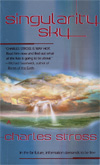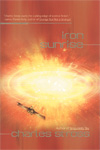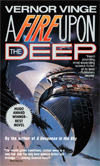| Site Info: | Favorites: | C++: | Fun: | Newer Stuff: | Old Fun: | Old Tech: | Old Other: |
| News | Rating System | MinGW Distro | Image Hacking | SF Reviews | Origami Polyhedra | bwtzip | Quotations |
| Stephan T. Lavavej | Paper Airplane | Random Work | Book Reviews | ||||
| Deus Ex | PNG | Downloads | |||||
| Anime/SF | Mersenne Primes | Wallpaper | |||||
| Foundation | Diet |
| Jump To: |
| No Spoilers |
| Summary |
| Reviews |
My reviews don't contain spoilers.
| Title | Author | Rating | Terse Summary | Terse Review |
| The Atrocity Archives | Charles Stross | Evil from beyond spacetime knocks at Earth's door. Further details are classified MAGINOT BLUE STARS. | An enjoyable SF novel with a horror spin and a quirky attitude. | |
| Singularity Sky | Charles Stross | An interstellar fleet rains self-replicating factories down on a backwards colony. Under the watchful eye of the superhuman intelligence known as the Eschaton, the colony tries to strike back at the fleet. | A weak novel that devotes far too little time to its most interesting character. | |
| Iron Sunrise | Charles Stross | Someone makes a colony's star explode. The survivors take revenge on the wrong people. The Eschaton has screwed up somewhere and tries to figure out what is going on. | An interesting novel that never actually ties up its plot. | |
| A Deepness In The Sky | Vernor Vinge | Humanity makes first contact with a technical alien civilization. | A novel of limitations and failed dreams that is a lie from beginning to end. | |
| A Fire Upon The Deep | Vernor Vinge | Humanity unleashes an ancient superhuman intelligence upon the galaxy. Badness ensues. | How to cope with galactic communications turbidity, the technological singularity, and transcendent evil. |
The Atrocity Archives by
Singularity Sky by
 |
Eschaton 1/2 This is a post-Singularity Stross novel. However, even though A Fire Upon The Deep is really good, and other Stross novels are really good, that doesn't make Singularity Sky really good. It's actually disappointingly weak. If I had to single out the main reason why this novel is weak, it would have to be that it tells a story where three cultures/entities interact. The first is the culture of the New Republic colony, which has rejected advanced technology and is apparently a pretty crummy place to live. I say "apparently" because the colony and its citizens aren't well characterized at all. The second is the culture/entity of the Festival, an interstellar fleet that has achieved an economic singularity but not a technological singularity. Past the economic singularity, a culture becomes post-scarcity. Post-scarcity cultures have been rather common in science fiction for quite some time now; the United Federation Of Planets is mostly a post-scarcity culture, although starships are still somewhat hard for them to construct. Another example: Iain M. Banks' Culture is definitely post-scarcity. In SF, the economic singularity is not a very new idea. The Festival is too weird, and its motivations too obscure, for it to be really compelling. The third actor in this novel is the Eschaton, an entity that has gone through the Technological Singularity. The Eschaton is far more interesting than the Festival, which in turn is far more interesting than the New Republic. The problem is that the novel devotes the least time to the Eschaton, and the most time to the New Republic. The plot isn't terribly interesting, and I find it hard to remember what actually happened. Strong plots are memorable; weak plots aren't. Now, the Eschaton is cool, like Old One from A Fire Upon The Deep. The Eschaton is also different from Old One - the big E plays a different role, being the only superhuman intelligence on the stage. That's also the problem. Superhuman intelligences are hard for writers to deal with - being superhuman, they have to stay at the edges of the plot so that the story can remain comprehensibly human. I would say that Singularity Sky is proof that solitary superhuman intelligences are even harder for writers to deal with, since their actions are unopposed. In the end, all that the Eschaton does is make some wickedly awesome threats and pull some obscure strings. And that's underwhelming. |
Iron Sunrise by
 |
Eschaton 2/2 This novel is a sequel to Singularity Sky. It's also an improvement upon the first story. There's a boring McWorld colony, but it gets nuclearated within the first few pages. The enemies are more comprehensible and more menacing. And most importantly, the Eschaton plays a greater role in events. Indeed, this would have been a great novel if it had a real ending. The problem is that the central question, which becomes obvious from rather early on in the plot, never gets resolved. It's not like there are tantalizing hints that are left scattered around, making the ending an exercise left to the reader. There just isn't an answer to the question. Iron Sunrise has interesting human characters, and some exciting action (what isn't exciting about blowing up a star?), but I can't recommend it very strongly. |
A Deepness In The Sky by
A Fire Upon The Deep by
 |
Zones Of Thought 2/2 This novel was published before A Deepness In The Sky but takes place later. I strongly recommend reading them in chronological order, not publication order (for reasons that cannot be explained without spoiling the whole point).
More than anything else, science fiction is about big ideas. This is what sets SF apart from other genres. While reading a Tom Clancy novel, I don't expect novel geopolitical insights. I expect to see stuff blow up and people get shot. Action-packed plots and detailed characters with understandable motivations are all well and good, and the lack of them has doomed many SF novels, but having them isn't enough. Great SF novels are woven around one or more big ideas. The best big ideas are surprising and new. For example, one of the big ideas in Foundation is the development of sociology into a quantitative, long-range, predictive tool and the wielding thereof. Most SF novels count themselves lucky to have one surprising, new, skillfully executed big idea. In A Fire Upon The Deep, there are so many big ideas that it's hard to enumerate them all. In many cases, these big ideas are not just new, they are unique. That is to say, they aren't found in any other novels. I have trouble thinking of even one other SF author who has such exclusive domination over such a vast set of ideas. I would even go so far as to say that Vernor Vinge has invented a new genre: computer science fiction. This is distinct from "science fiction with computers", not to mention cyberpunk. Computer science fiction explores the ultimate limits of computation, the interaction between computation and intelligence, and the transformative effects of computation on societies. Yes, I'm being vague as to what this novel is all about. It's very difficult to describe it without spoiling it. I can say that it gives unbelievable context and depth to A Deepness In The Sky. They are each standalone (the prequel because it comes first, the sequel because it was published first) and yet they are inextricably linked. I can also say that the Known Net is the niftiest SF network ever. Even the Qeng Ho Net pales in comparison. It is mind-blowing to realize that this novel was published in 1992, before the invention of the World Wide Web. A Fire Upon The Deep makes the present Internet look dated, and not the other way around. Vernor Vinge hopes to write a third novel in the Zones Of Thought universe, although the setting is still uncertain. (It might be a sequel to either of the first two novels, or it might be something else entirely.) I traditionally refer to this third novel by its conjectured name A Skyness Preposition The Noun. Words cannot describe how much I am looking forward to reading it. |
https://nuwen.net/sf.html (updated 10/26/2013)
Stephan T. Lavavej
Home: stl@nuwen.net
Work: stl@microsoft.com
This is my personal website. I work for Microsoft, but I don't speak for them.